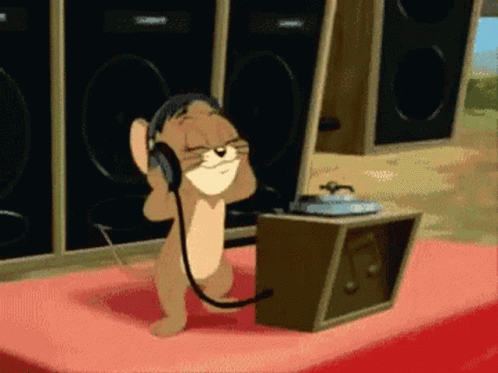In recent years, Lo-Fi music has become increasingly popular as a background soundtrack for studying and working. With its mellow beats and vintage aesthetic, many students and professionals alike have turned to Lo-Fi music as a way to improve concentration and productivity. But does it really work?
In this article, we’ll analyze the potential benefits and drawbacks of listening to Lo-Fi music while studying, as well as the scientific evidence to support or rebut these claims. I’ll also provide tips and recommendations for finding the right type of Lo-Fi music to enhance your focus and productivity.
What is Lo-Fi Music?
Before we dive into the topic of whether Lo-Fi music can really help us study or not, let’s first define what exactly Lo-Fi music is. The GIF you see above is from one of the most popular Lo-Fi channels on YouTube.
Lo-Fi, short for “low-fidelity,” is a genre characterized by its relaxed, chill vibes and vintage aesthetic. It’s often characterized by the use of samples from old jazz, soul, and hip-hop records, as well as the use of lo-fi production techniques like vinyl crackle and tape hiss to give it that warm, nostalgic feel.
While you don’t need to know the deep information, to know the basics, Lo-Fi music is perfect for studying, relaxing, or just enjoying a laid-back vibe.
It’s often associated with a specific aesthetic and often accompanied by visuals such as an animation of a cozy room with a record player, a fireplace, and a cup of coffee. With its mellow beats and nostalgic feel, Lo-Fi music is the perfect soundtrack for winding down or studying. You can also use Lo-Fi when you are working on your own side hustle or learning how to make money online as a student.
The Science behind Lo-Fi Music and Concentration
One of the main arguments for why Lo-Fi music can help with concentration is that it’s supposed to be calming and less distracting than other types of music. Studies have shown that background music can have an effect on the brain, specifically on the release of dopamine, a chemical that plays a role in motivation and attention.
Some studies have suggested that listening to music with a moderate tempo and no lyrics can help improve focus and concentration.
Another study conducted by the University of Helsinki found that background music can improve cognitive performance in tasks that require working memory and attention. They found that participants who listened to music with a moderate tempo performed better on cognitive tasks than those who listened to music with a fast tempo or no music at all.

However, it’s important to note that not all music is created equal when it comes to improving concentration. Some studies have shown that music with lyrics can be distracting and negatively impact cognitive performance. This is where Lo-Fi music comes in, as it often features instrumental beats and samples, making it less likely to be a distraction.
The Drawbacks of Lo-Fi Music
While Lo-Fi music has the potential to improve concentration and productivity, it’s important to note that it may not work for everyone. Some people may find that the nostalgic and vintage aesthetic of Lo-Fi music can be distracting and take them out of the present moment. Additionally, if you’re someone who is easily distracted by background noise, Lo-Fi music may not be the best option for you.
Another potential drawback of Lo-Fi music is that it may not be suitable for all types of tasks. For example, if you’re working on a task that requires a high level of creativity, Lo-Fi music may not be the best fit. This is because the mellow and repetitive beats of Lo-Fi music may not be stimulating enough to spark creativity.
Tips for Finding the Right Lo-Fi Music for Studying
If you’re interested in trying out Lo-Fi music as a study aid, here are some tips for finding the right type of music to enhance your focus and productivity:
1. Experiment with different types of Lo-Fi music
Not all Lo-Fi music is created equal, and what works for one person may not work for another. Experiment with different types of Lo-Fi music, such as jazz, hip-hop, or electronic, to find what works best for you. Spotify is a good place to find good music. If you don’t want to pay for a Spotify subscription, here’s How to use Spotify for FREE.
2. Pay attention to tempo
As mentioned earlier, studies have shown that music with a moderate tempo can help improve focus and concentration. Look for Lo-Fi music with a tempo between 60-80 BPM (beats per minute) for optimal results.
3. Avoid music with lyrics
As mentioned earlier, music with lyrics can be distracting and negatively impact cognitive performance. Stick to Lo-Fi music that is instrumental or features minimal vocals.
4. Use noise-canceling headphones
If you’re easily distracted by background noise, using noise-canceling headphones can help to block out external distractions and allow you to focus on the task at hand.
5. Create a playlist
Creating a playlist of your favorite Lo-Fi tracks can help to minimize the need for constant track switching, allowing you to maintain focus on your task. Here’s the playlist that I use most of the time.
6. Adjust the volume
Playing music at a low volume can help to minimize distractions and allow you to focus on your task.
Conclusion
In conclusion, Lo-Fi music has the potential to improve concentration and productivity while studying. The mellow beats and vintage aesthetic of Lo-Fi music can be calming and less distracting than other types of music. However, it’s important to note that Lo-Fi music may not work for everyone and it may not be suitable for all types of tasks.
It’s important to experiment with different types of Lo-Fi music, pay attention to tempo, avoid music with lyrics, use noise-canceling headphones, create a playlist and adjust the volume to find what works best for you.
Additionally, it’s important to remember that music is just one aspect of studying and other factors such as sleep, nutrition, and exercise also play an important role in overall cognitive performance. So, whether you’re a student or professional, give Lo-Fi music a try and see if it helps you to focus and increase productivity.

If you have any confusion or questions, feel free to drop a comment down below. Until then, you can read the below-given articles.
Also Read
- How to Use Canva Pro For FREE
- How to use Spotify for FREE
- How to use Parallels for FREE FOREVER on Macbook (M1+Intel)
- How To Use Adobe Lightroom, Photoshop, etc for FREE on MAC
- How To Use Final Cut Pro X for FREE Forever
- How To Use Microsoft Office Apps For FREE (even offline)
- How To Read Wall Street Journal, NY Times, etc For FREE

